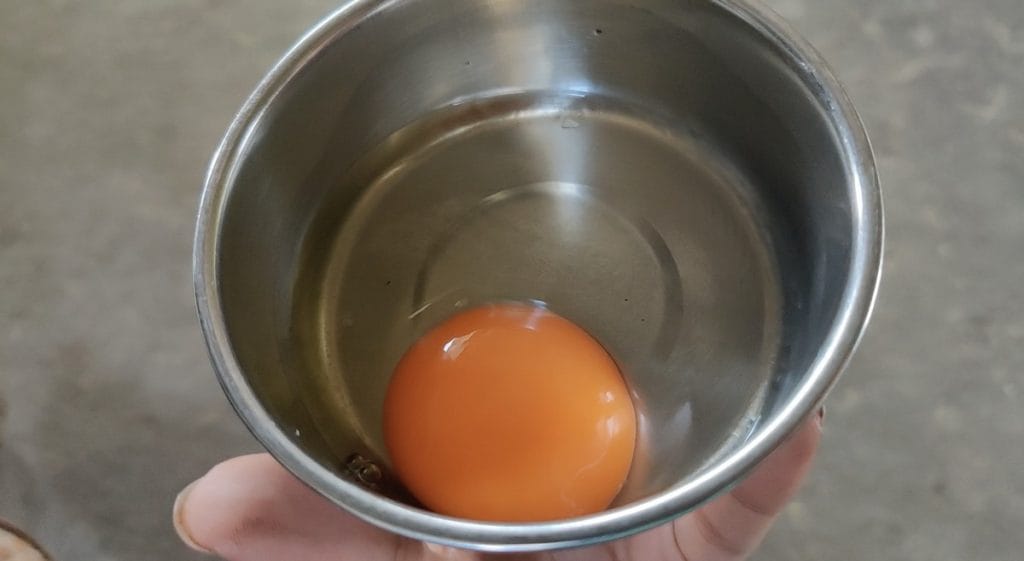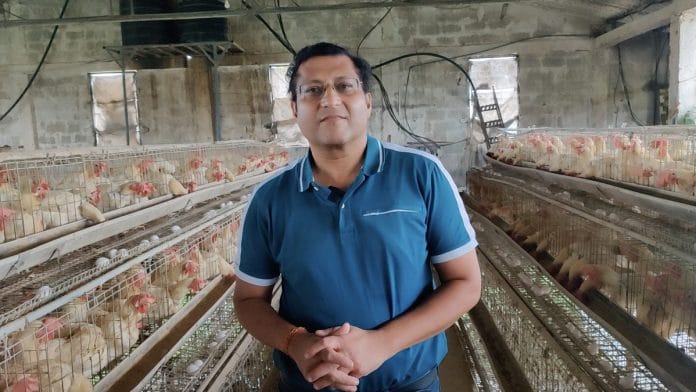Bhopal: At first light, a synchronised wave of 6,000 beaks pokes through metal bars at Aditya Gupta’s poultry farm in Eint Khedi village, 20 minutes from Bhopal airport. Their breakfast glides along a curved metal tray running the length of the cage rows, stacked neatly in military-like tiers. It isn’t just corn or grain but a mix that could stock an Ayurvedic kitchen—tulsi, turmeric, ashwagandha, oregano, parsley, thyme, spirulina, basil, sage, mint.
Gupta says it’s what makes his birds lay “herbal eggs”, the latest entrant in India’s growing health-food obsession.
“We use over 250 different herbs. But don’t ask me to list the lesser-known herbs, it’s a trade secret,” he said. Not just that, the feed is patented.
Chickens are being put on vegetarian, herb-fed diets, in the hopes of their laying eggs that promise less of an eggy smell, smoother taste, and a nutrient boost — more “good” cholesterol, higher protein, extra vitamin D, a dash of omega-3. Free-range, corn-fed, and organic are yesterday’s labels; the new frontier is ‘value-added’ and herbal eggs.
New brands pop up regularly on Amazon, BigBasket, and Instamart. Eggoz, which more than doubled its revenue in one year to Rs 130 crore in 2025, sells “herbal-fed” selenium-fortified eggs. Henfruit feeds its hens neem, tulsi, and turmeric. Eggnest has its “Herbal Promax” line. Other brands like Abhi Eggs and Good Eggs, meanwhile, boast fortifications with various nutrients.

Compared to regular eggs that sell for Rs 6 apiece, value-added ones retail around Rs 9 and can go up to Rs 16. The appeal isn’t limited to health-conscious buyers; even some with egg allergies or sensitivities report better tolerance.
“Feeding birds herbal supplements definitely changes the nutrient profile of eggs,” explained Hyderabad-based nutritionist Nida Fatima Hazari.
“Many large trials have not been conducted, but a reasonable amount of research does show that herbal eggs can boost immunity and help reduce cholesterol levels. Scientific studies also suggest that they support a favourable lipid profile.”
They don’t smell like regular eggs, and they feel clean almost like they belong in a vegetarian kitchen
-Aditi Acharya, Bhopal resident
The market share of ‘value-added eggs’ is still tiny—only 0.1 per cent, according to Sanjeev Chintawar, assistant general manager (Business Development) at the National Egg Coordination Committee (NECC), the cooperative body that sets benchmark prices for eggs across the country. But, as he acknowledged, it’s still a segment in its own right. Herbal eggs are slowly inching onto breakfast tables next to sourdough and brown rice as consumers grow fussier about what feeds their food.
And it’s not just a metro fad. Gupta’s own brand, Eggs & Eggs, sells only in Bhopal currently, relying mostly on word-of-mouth and a modest Instagram page that preaches the health gospel of herbal eggs.
One convert is Bhopal resident Dr Shailendra Singh Rana, a former Army officer. Two weeks of steroid-heavy treatment, in August 2022, for meningitis left him 25 kilos lighter, red patches across his skin, and energy levels at rock bottom. Doctors gave him a recovery timeline of at least two years, but he claims he was able to bounce back in six months because of the new and improved eggs he ate.
“Herbal eggs from Aditya Poultry Farm were a life-saver,” said the 43-year-old, who’d spent his whole life avoiding eggs since he hated the smell. “I started to eat them daily. Boiled eggs for breakfast, omelette for lunch, and egg curry for dinner, every single day. That was my secret of recovery.” He might skip a meal, but never the herbal eggs.
Also Read: Startups to govt policies—India wants to lead the lab-grown meat revolution
A patented poultry feed
At Gupta’s poultry farm, a worker serves up four freshly boiled eggs, steam still rising from their shells. He peels them, one after the other, and slices them open with a small knife.
The yolks inside gleam a vibrant and glassy orange. Their texture is delicate, almost creamy. They melt on the tongue, the taste smoother, creamier than ordinary eggs.
For Gupta, the move to herbal poultry farming came less from innovation than necessity. A software engineer by training, he entered his family’s business in the early 2000s. They had 60,000 birds but, like many large-scale farmers, faced the industry’s harsh reality: high bird mortality.
His turning point came in 2018 after a cancer diagnosis. Forced to slow down, he began reading about Ayurveda and the healing power of herbs.

“We did post-mortems on every bird that died,” he recalled. “We experimented— if a disease struck, we added herbs. If immunity needed boosting, we added different herbs. And we even balanced the proportion of every herb.”
Three years and countless trials later, Gupta filed for a patent. In June last year, the Indian Patents Office granted him one for his herbal feed, which he said produces eggs naturally “low in cholesterol and rich in Omega-3 and Omega-7 fatty acids.”
Eggs are among the cheapest sources of high-value protein. While the protein quantity doesn’t vary much between regular and herbal eggs, nutritionist Hazari said the quality — the amino-acid profile — can be altered by enriching a bird’s diet, although she cautioned the research is still limited.
“For example, adding flaxseed or linseed to chicken feed can increase the omega-3 fatty acid content of egg yolks, which has protective cardiovascular and immunological benefits. Garlic, on the other hand, has been proven as a beneficial feed additive for improving egg yolk quality and the lipid profile in poultry,” Hazari added.
We experimented— if a disease struck, we added herbs. If immunity needed boosting, we added different herbs. And we even balanced the proportion of every herb
-Aditya Gupta
Meanwhile, Gupta has filed five more patent applications in India and three in the US. His latest innovation is feed designed to produce hypoallergenic eggs that don’t trigger the queasy reactions that some experience with regular ones.
“Hypoallergenic eggs can also cater to vegetarians who don’t like the smell of eggs,” he said.
To illustrate his point, Gupta cracked open a raw egg into a bowl. He lifted the bowl, took a sniff, then downed the raw egg in one gulp.
“I only eat them like this now. It has 90 per cent digestible protein so it keeps me full,” he smiled.
He is not worried about salmonella, even though there’s no scientific evidence to suggest that the type of feed eliminates bacterial growth.
“Eggs are usually recommended to be eaten cooked because heat kills bacteria. But ours have no bacterial infection — because of the turmeric and other herbs we give to the birds.”
Value-added vs herbal eggs
In Doraha village, on the outskirts of Bhopal, poultry farmer Ashwin Reddy runs Kiwi Agro, a 36-year-old family business. His brand, Reddeggs, is among the city’s largest suppliers, delivering nearly two million eggs a day.
He’s kept up with the times and sells eggs enriched with Vitamin A, D3, E and Selenium. But he dismisses the concept of herbal eggs as a “marketing gimmick”.
“Herbs don’t significantly benefit the birds or the eggs,” Reddy said, adding that the only exception is turmeric due to its antibiotic properties. “I’m not against herbal eggs but the market is very niche, growth is stagnant, and the cost goes up because of the added herbs.”
Down south, Hyderabad-based poultry farmer Arun Kumar Reddy Kotha echoes the sentiment. The 35-year-old also sells “value-added” eggs but calls the “herbal” and “high-protein” labels pure marketing.
I am Baniya. I don’t eat meat, but I do eat table eggs. By nature, unfertilised eggs are vegetarian. More awareness is needed to drive this message home
-Sanjeev Chintawar, NECC
“There’s no such thing. If someone says their eggs have more protein than regular ones, they’re lying — it’s not possible,” said Kotha, who manages his family’s sprawling farm of nearly 8 lakh birds in Humnabad. However, he added, other nutrient levels in an egg can be tweaked via the feed.
Five years ago, Kotha began experimenting with feed to improve nutrition, selecting a small batch of 15,000–16,000 birds.
“The basics were always running smoothly but I wanted to push the boundaries—not just more eggs, but better ones,” he said. “We started adding flaxseeds to increase the omega-3 content. But it’s not just about throwing seeds into the feed. You need to ensure the birds digest it well, and that the nutrients actually make their way into the eggs. Hence, you have to balance it with other nutrients.”

It was anything but simple. Getting the right balance meant trial, error, and a fair bit of frustration.
“You’re not just dealing with nutrition; you’re dealing with biology, with birds that respond differently depending on weather, feed quality, and even stress,” he said.
While regular eggs have negligible omega-3 content, Kotha’s enriched eggs contain around 330 mg per 100 grams, or roughly two eggs’ worth. At one point, he tried fortifying them with six nutrients —Vitamins A, E, D3, Omega-3, carotenoids, and selenium — but the balance proved tricky.
“We had to drop D3. It just wasn’t working with the rest of the mix,” he said.
The farm produces around 6 lakh regular eggs a day, each selling for Rs 5.20. His premium, fortified eggs — 10,000 to 12,000 a day, mostly sold in Hyderabad and Bengaluru — sell for Rs 16 apiece.
“Demand hasn’t been a problem. In fact, I often struggle to keep up,” he said.
Also Read: India’s sober revolution—the young in the cities are cutting down on drinking
Herbal eggs for ‘veg’ branding?
India is the world’s second-largest producer of eggs, with the market pegged at Rs 2.3 lakh crore in 2024 and expected to reach Rs 8.4 lakh crore by 2033, per government projections. But it wasn’t an easy market to crack.
In the 1980s, when India’s poultry industry was still struggling, the National Egg Coordination Committee launched its famous campaign — “Sunday ho ya Monday, roz khao ande” (Whether it’s Sunday or Monday, eat eggs every day). The jingle resonated with middle-class families, making eggs a staple and a symbol of affordable nutrition.
Four decades on, NECC is fighting a different battle: convincing India that unfertilised eggs are, by definition, vegetarian.
“I am Baniya. I don’t eat meat, but I do eat table eggs. By nature, unfertilised eggs are vegetarian. More awareness is needed to drive this message home,” said NECC’s Chintawar.
Herbal eggs may make that task easier.
The odourless eggs from Aditya Poultry Farm in Bhopal, for one, have turned even strict vegetarians into customers. Aditi Acharya, 33, who even avoids onion and garlic at home, changed her stance because her son’s protein intake was low.

Initially, her son refused to eat boiled eggs because of the smell. After a relative recommended herbal eggs from Aditya Poultry Farm, she bought a six-pack — and eggs have since become a staple at their breakfast table.
“India has always been a carbohydrate-heavy country. Protein intake has traditionally been low, partly because it wasn’t easily accessible,” said KG Anand, general manager of Venkateshwara Hatcheries Ltd in Hyderabad, a major egg producer that helped found the NECC. “Now, due to Western influence, social media trends, and growing awareness, there’s a surge in demand for protein. But vegetarians have limited sources, like pulses and chickpeas, which aren’t always enough.”
NECC, however, isn’t yet promoting herbal eggs.
“We focus on promoting eggs for the broader market, not specialised or niche products,” Anand said. “Our priority is the 99.99 per cent of the market, not the small 0.1 per cent segment.”
He nevertheless acknowledged that herbal eggs are increasingly being accepted, especially among children and the elderly, because they provide an easily digestible source of protein.
For Acharya, embracing herbal eggs wasn’t a compromise on her values, but a reimagining of them — a way to meet her son’s nutritional needs without crossing her personal line.
“They don’t smell like regular eggs, and they feel clean almost like they belong in a vegetarian kitchen,” she said.
(Edited by Asavari Singh)







“They don’t smell like regular eggs, and they feel clean almost like they belong in a vegetarian kitchen,”,- typical superiority complex if you ask me, I mean what kinda stereotype is she tryna pull- making vegetarian to be clean and pure just because of a egg smell. That’s it characteristic- honestly that lady is a total freak who is obsessed with morale hierarchy thereby demeaning non vegetarians, if removing smell makes it acceptable then sooner everything should be sold after adding perfumes and deodorant. It’s high time these fools stop with their food based stigma, and accept the reality instead of doing mental gymnastics.
Kya उल्लू बना रहे हो